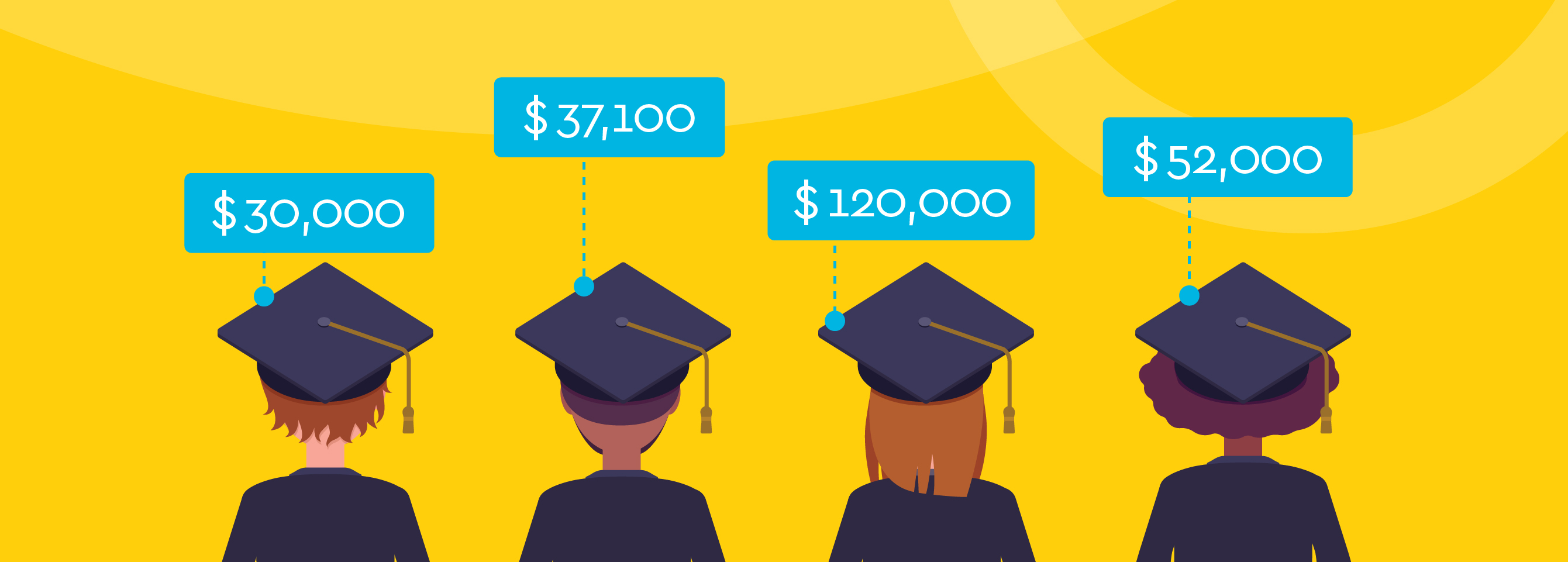Whereas a college degree may lead to higher income, that does not mean student loans are always worth it. Borrowing money is a significant decision, with many elements to consider. Your college major, the cost of your school, job prospects, and the total amount of student loans may affect your family’s financial situation for decades.
Before signing for a student loan, consider your field and income potential. Try to evaluate your monthly payments and how they might impact your future budget. By knowing the essential details upfront, it might be easier to decide how much, if any, you are willing to borrow for college. Before considering student loans, find free money for college by taking advantage of grants and scholarships.
For the graduating class of 2016, the standard debt load of indebted students gushed over $37,000 for the first time. And at the national level, the delinquency rate on student loans is well over eleven-percent. To most people, this amount is nothing more than a shocking number to balk at- an anomaly shared on the nightly news. However, for others, their share represents so much more: Frustration, shame, and fear. It is a lifetime sentence of debt. And for most, it represents regret. Few students comprehend the effects of borrowing too much money for school, and even fewer understand what their student loans will mean to their lives, ten, or even twenty years from now. However, once they sign on that dotted line, it is often too late to determine if students’ loans are worth it.
How to figure out if student loans are worth it for your family?
College cost
College cost varies by school. It is simple to get carried away as college acceptance letters start to roll in. You might have visions of your dream school- till you see the price tag. Nonetheless, there is a big difference in the cost between schools, particularly when comparing private versus public colleges. The average cost for every year for a four-year school can vary between $$49, 870 to $21,950 for private and public schools, respectively, by the College Board.
You might picture yourself sporting a sweatshirt from a big-name private college, but the cost for attending might not pay off, particularly if you require massive amounts of student loans to pay for it. On-time graduation rates might be higher, but private colleges might not lead to better job prospects. Before making a decision based on the college’s reputation alone, consider the full cost- and-financing options- from a range of schools. After crunching the numbers, you might find some unexpected choices providing the best value.
Typically, not all majors have the same income potential
It can be challenging in your college-age to choose a future career. Students might choose a school based on a particular program. However, thirty percent will change majors within three years following the Department of Education. While swapping majors might not seem like a big deal, your studies might have a direct effect on their future earnings.
By a 2019 survey from the National Association of Colleges and Employers (NACE), learners with a STEM degree can wait to earn the highest average starting salary. Student loans are a great decision that you will have to grapple with many years after college. Before signing up for a huge student loan balance, conduct some research on their major’s income potential. It might be easier to justify a considerable student loan balance for in-demand, higher-paying fields. But you can opt to spend less for a major with lower earning potential.
Remember students loans are not free money
We have all heard about people who borrowed money for school only to waste it in the worst ways- for new clothes, spring break trips, and fun nights at their favorite watering hole. Such stories play out all across the country, leaving graduates being in more debt than they can sensibly payback and with little to show for it. Student loans can be overwhelming, and after paying for the basics such as tuition and textbooks, students tend to spend the rest in frivolous ways. The money will eventually run out, and you will be justify with bills to pay, and the latter part of your college days can be adamant financially.
Consider student payment options what they actually mean
When you graduate with student loan debt, you will find various repayment options to choose from. You can either stick with a standard, ten-year repayment plan, select an income-driven repayment alternative if you qualify, or even extend your repayment plan in almost any fashion that works. Some of those alternatives will leave you paying mostly interest and almost nothing- or even nothing at all- towards the principal of your loan. And in case you find yourself in that type of repayment plan, paying off your loans is practically impossible.
College graduates might have more financial stability
Whereas a college degree is no guarantee of future career success, experts agree getting an education is a good investment for most people. The median earnings for people with a bachelor’s degree are sixty-seven percent higher than those with a high school diploma, following the College Board. The income gap is even wider for college-educated millennial women, who earn eighty-four more than women with only a high school education. And earnings for both men and women keep on rising with each level of education.
For those who worry about job stability and economy- and many people do- the prospect of layoffs can be daunting. Unemployment is frequently twice as high for those without a college degree. During the reporting period, eighty-three percent of folks with a bachelor’s degree or higher had a job, though. The report also discovered a college degree increases the possibilities of financial stability, and it decreases the likelihood of relying on public assistance. Earning a college degree might also lead to a healthier lifestyle and reduce health care costs.
The intangible cost of student loans
Student loans can assist you in attaining your objectives when you go into debt with your eyes wide open. Bear in mind that your personal interest and skills should also guide your choice. You are more likely to stick with a field that aligns with your interests. Whereas the decision is not all about finances, you require to be aware of the financial implications of taking on student loan debt. Various paths can lead to your future career. But none of them should end in debilitating debt.
But the main question is what good is a higher income ‘someday’ if half of it goes to pay off student loans for the first twenty years. And what if something happens? Student loans are not dischargeable in bankruptcy. These debts will remain with you for life. But even more importantly is: What do you lose by having all that debt?
In conclusion, as you can see with so many layers, based on your answer will really dictate whether students are worth it. It is best, to begin with, your degree and determine if the long term outlook of that degree will assist you in getting a job. Then, ensure you are only using what you require when it comes to student loans. Do not just use loans because you have them, first gain perspective from other borrowers, but do not just take their words for it. For example, someone might have had a huge student loan and find it worth it. Somebody else may not. Remember, by going in with a strategic student loan plan, you can attain the degree and career you want without signing up for a massive student loan burden. In the end, the real answer to; whether student loans are worth it depends, but always be sure to treat student loans as an investment.













